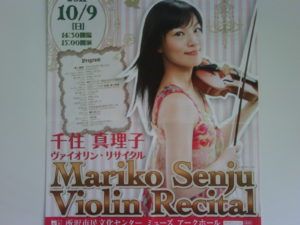The violinist is indispensable to Japan
One question culture is often asked: What role does it play after the earthquake and tsunami in March? Because it can give relief, energy and hope, it should be used to provide encouragement to the victims and survivors of the disaster and to reconstruct disaster affected areas. But How?
Mariko Senju, a Japanese violinist, shows how to do it. She held a recital at Tokorozawa Muse in Saitama in October. She mainly performed pieces that heal feelings and pains, ranging from Ave Maria by Bach, Sonata Pathetic by Beethoven to Moonlight by Debussy. At the recital she said that she has been performing pieces full of comfort this year.
Many studies show that classical music has healing effects. A paper from Southern Medical Association in 2005 says that music distracts patients from pain and unpleasant feelings and improves mood. Several reasons can be given for those effects. One reason may be that classical music connects memories to make a drama, according to an expert.
The minds of performers may be related to music’s healing power. Ms Senju scientifically researched music in college. As a result, she found that it was the core part of consciousness of the performer that reached audiences. As she has played in front of dying elderly people at a hospice before, it is very important for her to put her heart in the sounds. That is what she learnt from that experience.
Bach’s songs seem to have something to do with healing. To her, his pieces are prayer. She says that they make her feel enlightenment beyond human knowledge and tell her that there is no one who cannot rise from despair. Even Seiji Ozawa, a Japanese conductor, performed Aria on G as a requiem for the victims of the Hanshin-Awaji earthquake in 1995. All this suggests that Bach’s pieces are a miracle cure to bring healing to people.
America offers an example of what role culture plays after tragic events. There is a view that its cultural atmosphere has changed after the 9/11: a shift from selfishness to caring for others. “God Bless America” had a huge resurgence in popularity partly because it is one of the few songs most American people know, according to Harvard Gazette. [i] “On The Transmigration of Souls” was created, which is like a large cathedral to which people go with their thoughts. According to an American writer, this song finds university in a way that nothing else yet has in classical music: it speaks directly to the tragedy while simultaneously transcending it.[ii]
In both Japan and abroad artists feel the same things after such tragedies. They feel powerless, but they want to somehow help victims. To have and maintain this sense of connection, Masaharu Fukuyama, one of the most popular singers in Japan, run a 24-hour charity radio programme after the 3/11. Most of music is borne out of strong feelings of performers and composers. Sincere and personal responses translate best to the treating of others, says one American writer.[iii]
Ms Senju has different things from other performers. There were some foreign performers who cancelled their tours in Japan because of fears of nuclear radiation. But Ms Senju is going to play in Fukushima in December. Most remarkable thing is that she has released “Japanese songs for violin and piano” in late October. She plays famous Japanese songs such as “Furusato (meaning in Japanese home)” and “Yuuyake-koyake (a sunset)” on the violin. After the 3/11 she thought she wanted to play traditional Japanese songs. “Akatonbo (red dragonfly)” pulls our heartstrings. Like the American example, this album may become widely successful because these songs are very popular among Japanese people.
Ms Senju’s performance rings in the soul of Japanese people. She is indispensable to the country faced with many challenges.
[i] Havard Gazette “American tune”
[ii] Devonport.com “Classical Music: John Adams’ “Transmigration” succeeds as 9/11 eulogy”
http://www.denverpost.com/kylemacmillan/ci_18855448
[iii] post-gazette.com “The Arts Respond: Expressing emotions the classical music way”
http://www.post-gazette.com/ae/20020908classical0908fnp5.asp

Ryo Kubota is a staff writer at Transpheric Management in Tokyo as well as a freelance writer. He has covered Sports for the Nippon Newspaper Company in Tokyo and teaches at a private tutoring school in Iruma, Japan. Having studied in both Tokyo and England in the areas of sociology, he has a keen interest in the world at large.









